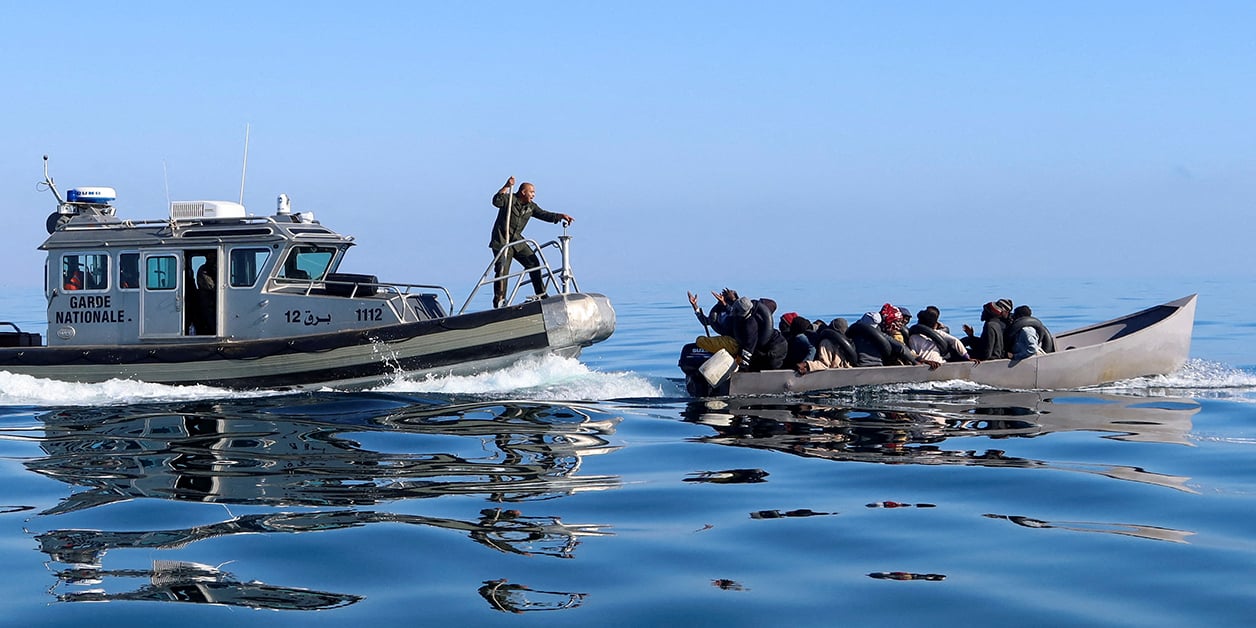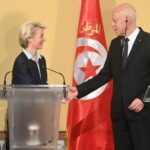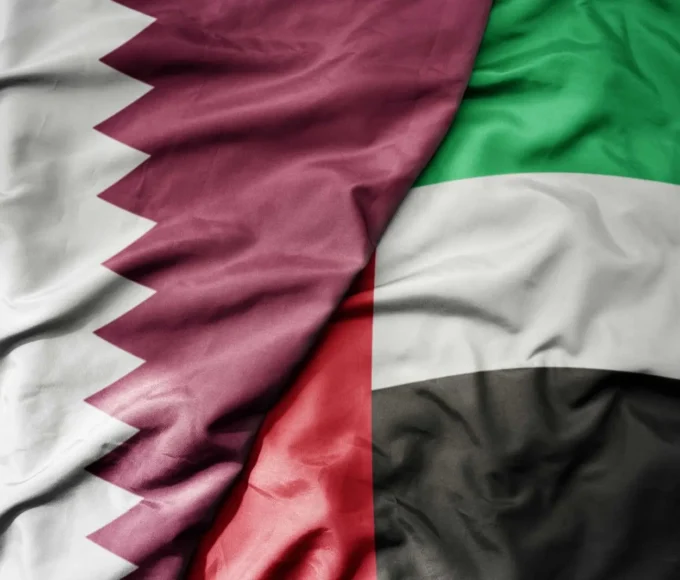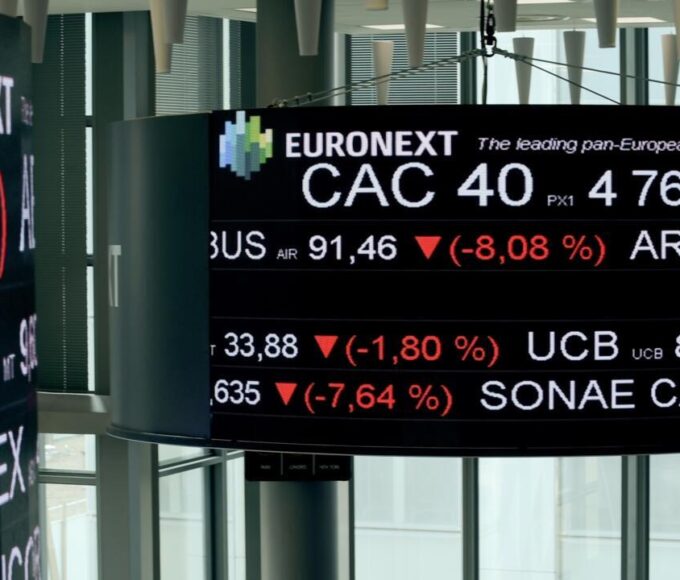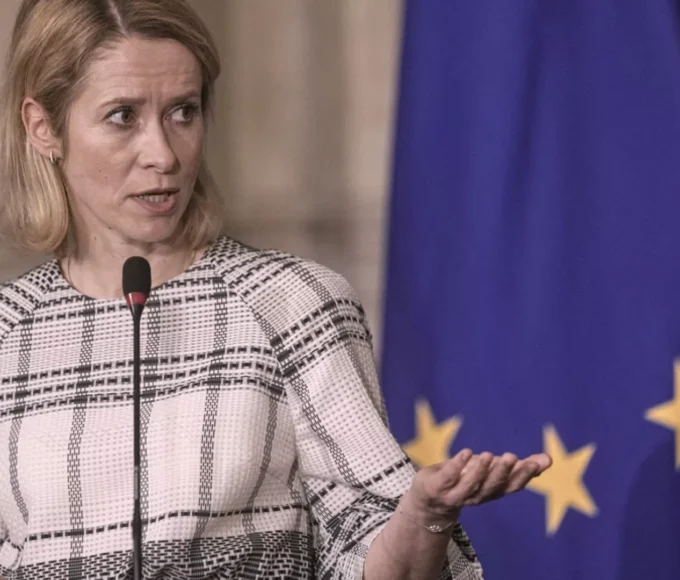Tunis finally accepted the European proposal to control migratory flows in exchange for economic aid. But many in the country believe that by doing so, the country is dishonoring itself for paltry sums.
The European Union finally made the Tunisian president bend by getting him to ratify, on July 16, a historic agreement between his country and Brussels. It seems that all that was needed were the “360 degree” smiles – according to her own expression – from the President of the Italian Council, Giorgia Meloni, the restraint of the President of the European Commission and the relaxation of the outgoing Dutch head of government , Mark Rutte, to overcome the reluctance of Kaïs Saïed.
In reality, this scorching afternoon of July 16 in Carthage marks a real turning point in Tunisian-European relations. At the cost of a forced passage and some counterparts, Europe achieves its objective of making Tunisia, not strictly speaking a detention center, but a space for processing irregular migrants, undesirable on its territory. A service that it already provided for Italy, under bilateral agreements.
Responsibility for shipwrecks
From now on, Tunisia will guarantee increased control at its borders, in particular maritime surveillance beyond its territorial waters where joint operations with the European control body Frontex will be carried out. In case of problems at sea, we will call on Tunisia and Europe will not take responsibility for any shipwrecks.
If an agreement was reached on July 16, it is also proof that negotiations have gone well in recent weeks, despite the denials of spokespersons in Brussels. In the very noticeable absence of the Minister of Foreign Affairs, Nabil Ammar, on tour in the Gulf countries, the signature of the official document fell to Mounir Ben Rejiba, Secretary of State to the Minister of Foreign Affairs, Migration and Tunisians Abroad and Olivér Várhelyi, European Commissioner for Enlargement and European Neighborhood Policy.
“Agreement of Shame”
The content of the document signed by the two parties, however, goes against all the recent declarations of the tenant of Carthage, who has constantly maintained that “the country was not intended to become the border guard of the Europa”. 105 million euros later, it is now the case. This amount allocated by the EU is intended to fight against irregular immigration and human trafficking networks, a vast program supposedly generous with regard to a country in distress. But the purpose of the maneuver is for Tunisia to receive unwanted migrants in Europe and to manage their return to their country of origin. This is the key point at the end of the memorandum that some in Tunis are already calling an “agreement of shame”.
In return, and as announced on June 12 during the first visit of the President of the European Commission, Europe wanted to be prodigal: to the payment to make Tunisia the leader of the Mediterranean, it adds various envelopes intended for the economic development and other trifles that seem completely irrelevant in the current Tunisian context. “Everything is good to take”, comments a former minister who wants to be positive and says he is certain of the good intentions of Europe.
Ursula von der Leyen listed the five pillars supporting the partnership: “macroeconomic stability, trade and investment, green energy transition, bringing people together, migration and mobility”. Nothing but classic for the first four pillars. The fifth, on migration and mobility, is drowned in a “humanly correct” vocabulary to finally mean that Europe only wants foreigners it has chosen: the free movement of individuals becomes a myth that has lived, the Europe too.
All the provisions of the memorandum are accompanied by budgetary support of 105 million euros which should, in theory, be disbursed quickly (even if it will a priori be necessary to wait for a vote by MEPs), while 80 schools will benefit from aid of 65 million euros. But the famous 900 million euros in assistance announced during the visit of the European trio in June remain dependent on the conclusion of an agreement with the International Monetary Fund (IMF). It will not be for tomorrow since the Bretton Woods institution considers that the outstanding credit of Tunisia is obsolete, and proposes to the authorities to present a new argued file. “A negotiation that will last at least a year,” says an econom
The precedent of the Aleca
“These 105 million euros are a joke with regard to the image of Tunisia, whose sovereignty is violated. The country has been sold off by the one who is supposed to protect it, the one who was supposedly intractable in terms of interference and who continues to transform reality in the light of what he is told, “is indignant a user who claims to have had blind faith in Kaïs Saïed for a long time. “I thought that everyone could lie but not him, adds Hatem. There, he dared: facing the nation, he assured us that Tunisia had treated sub-Saharans in an irregular situation humanely. He finds it “human” to deport people to the desert in the middle of a heat wave? I am ashamed ! In its own way, this comment reflects the dismay of many Tunisians who thought that Kaïs Saïed had to be given time to clean up a deleterious political climate before restarting the machine.
For many, including among the president’s supporters, the memorandum signed with the EU is experienced as a humiliation. “Our pride is worth more than 105 million euros to do the dirty work of the Europeans”, protests one of them. More pragmatically, Romdhane Ben Amor, spokesperson for the Tunisian Forum for Economic and Social Rights (FTDES), affirms that this agreement makes Tunisia “a dustbin of European migration policies” and takes up “the elements linked to migration included in the ‘Aleca (Deep and Comprehensive Free Trade Agreement) which was rejected by civil forces and young people’. According to him, “this memorandum of understanding which adopts “readmission”, that is to say collective expulsion based on identity, enshrines the inequalities between categories and classes in terms of the right to mobility”. .
The situation becomes all the more incoherent as the strategy of the presidency is difficult to read. After stirring up hatred against migrants in February, Kaïs Saïed ordered that those congregating in Sfax be moved to the border desert between Tunisia and Libya or Algeria, to then repatriate them to Ben Guerdane, in the south of the country. During the national security council held on July 14, the president also wondered about the sums from sub-Saharan countries – he cites an amount of 23 million dinars – arriving in Sfax during the first quarter of 2023.
The sum seems enormous and it is not absurd that the president wonders but, specify economists working on the transfers across the continent, there is error. Those who alerted the Head of State to these money transfers did not specify that the amounts – taken from Western Union documents provided by the Tunisian post – were expressed in CFA francs. We are therefore no longer talking, at the current price, of more than 119,453 dinars, or just over 35,000 euros. Ridiculous, but it was enough to put into a trance those who, in Tunis, think that the country is the subject of an African plot.
Disgruntled MEPs
On the European side too, the text signed on July 16 is causing a reaction. While it is rumored that it could serve as a framework to apply to other countries of departure of migrants, some MEPs were surprised at a press conference that Parliament was not consulted. They recalled that, to be valid, the agreements made by Brussels can only be made with countries that respect human rights. However, Tunisia has recently been singled out several times on this subject.
At this point, only the President of the Italian Council can triumph. The charm operation that it launched in the direction of Kaïs Saïed since May, alternating between conciliatory attitudes and the blocking of certain votes in the European Council, in particular that of the ratification of the reform of the permanent rescue fund of the zone euro, seems to have paid.
“We thought we were Europeans, which we will never be, but in the end we accepted their diktat and damaged our relations with Africa. African countries should show firmness towards Tunisia”, comments Majdi Karbaï, former Tunisian MP active in civil society in Italy.
Tunisia will have the opportunity to clarify its position and deploy a minimum of diplomacy to restore its relations with sub-Saharan countries from July 23, during the Migration Summit, organized by Giorgia Meloni in Rome. Kaïs Saïed, to whom this initiative belongs, will only be the guest of honor of the event, for which no program has been announced. And of which we still do not know who, of the leaders of the countries concerned by migration, will or will not be present.
This article is originally published on jeuneafrique.com


